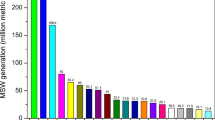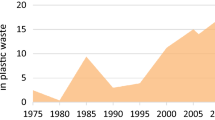Abstract
Solid waste disposal in Sri Lanka has been assessed using environmental, economic, and social indicators, based on a life cycle approach. The existing situation of open dumping in Sri Lanka was compared with that of a sanitary landfill with gas recovery, since the latter is anticipated to constitute an initial step towards sustainable development. The results revealed the extent to which sanitary landfills with gas recovery systems could contribute to reducing environmental impacts such as global warming potential, acidification potential, and eutrophication potential. Assessment of life cycle cost and damage to human health also showed results in favour of sanitary landfills with gas recovery system. The results obtained quantify the sustainability benefits of the proposed option for solid waste management, and can be useful for justifying policy measures that encourage the replacement of open dumping with sanitary landfills.




Similar content being viewed by others
References
Visvanathan C, Trankler J, Joseph K, Chiemchaisri C, Basnayake BFA, Gongming Z (2004) Municipal solid waste management in Asia. Asian Regional Research Program on Environmental Technology (ARRPET). Asian Institute of Technology publications. ISBN: 974-417-258-1
Vidanaarachchi CK, Yuen STS, Pilapitiya S (2006) Municipal solid waste management in the Southern Province of Sri Lanka: problems, issues and challenges. Waste Manag 26:920–930
Al-Khatib IA, Monou M, Salam FA, Zahra A, Shaheen HQ, Kassinos D (2010) Solid waste characterization, quantification and management practices in developing countries. A case study: Nablus district—Palestine. J Environ Manag 91:1131–1138
Wel A, Post V (2007) Solid waste management in Sri Lanka: policy & strategy. WASTE project report. Nieuwehaven 201, 2801 CW Gouda, The Netherlands
Asian Productivity Organization (2007) Solid waste management issues challengers in Asia, Sri Lanka. ISBN: 92-833-7058-9, pp 246–273
Alwis AD (2002) Biogas—a review of Sri Lanka’s performance with a renewable energy technology. Energ Sustain Develop 6(1):30–37
Basnayake BFA, Ekanayake KM (2005) Evaluation of different municipal solid waste landfill pretreatment (composting) systems in Sri Lanka. In: Presented at tenth international waste management and landfill symposium—Sardinia 3–7 October 2005 at Santa Margherita di Pula (Cagliari) Sardinia—Italy
Gunawardana EGW, Basnayake BFA, Shimada S, Iwata T (2009) Influence of biological pre-treatment of municipal solid waste on landfill behaviour in Sri Lanka. Waste Manag Res 27(5):456–462
Inazumi S, Ohtsu H, Shiotani T, Katsumi T (2011) Environmental assessment and accounting for the waste disposal stream in Bangkok, Thailand. J Mater Cycles Waste Manag 13:139–149
Menikpura SNM, Basnayake BFA, Boyagoda PB, Kularathne IW (2007) Application of waste to energy concept based on experimental and model predictions of calorific values for enhancing the environment of Kandy city. Trop Agric Res 19:389–400
Database of Municipal Solid Waste in Sri Lanka (2005) Ministry of environmental and natural resources. Pollution control division, Battaramulla
Kandy Municipal Council (2010) Kandy Municipal Council, Central Province, Sri Lanka (personal communication)
Menikpura SNM, Basnayake BFA, Pathirana KPMN, Senevirathne SADS (2008) Prediction of present pollution levels in Gohagoda dumpsite and remediation measures: Sri Lanka. In: Conference proceedings—APLAS international solid waste management symposium, 22–25 October 2008, Sapporo, Japan
Liamsanguan C, Gheewala SH (2008) LCA: a decision support tool for environmental assessment of MSW management systems. J Environ Manag 87:132–138
Chaya W, Gheewala SH (2007) Life cycle assessment of MSW-to-energy schemes in Thailand. J Clean Prod 15:1463–1468
Wanichpongpan W, Gheewala SH (2007) Life cycle assessment as a decision support tool for landfill gas-to energy projects. J Clean Prod 15:1819–1826
Liamsanguan C, Gheewala SH (2008) The holistic impact of integrated solid waste management on greenhouse gas emissions in Phuket. J Clean Prod 16(17):1865–1871
Ometto AR, Filho AG, Souza MP (2006) Implementation of life cycle thinking in Brazil’s Environmental Policy. Environ Sci Policy 9:587–592
Thabrew L, Wiek A, Ries R (2009) Environmental decision making in multi-stakeholder contexts: applicability of life cycle thinking in development planning and implementation. J Clean Prod 17:67–76
Den Boer J, den Boer E, Jager J (2007) LCA-IWM: a decision support tool for sustainability assessment of waste management systems. Waste Manag 27:1032–1045
Moutavtchi V, Stenis J, Hogland W, Shepeleva A (2010) Solid waste management by application of the WAMED model. J Mater Cycles Waste Manag 12:169–183
Ngoc UN, Schnitzer H (2009) Sustainable solutions for solid waste management in Southeast Asian countries. Waste Manag 29:1982–1995
WHO (2007) Population health and waste management: scientific data and policy options. Report of a WHO Workshop, Rome, Italy, 29–30 March 2007
ISO (2006a) ISO 14040 international standard. In: Environmental management—life cycle assessment—principles and framework. International Organisation for Standardization, Geneva, Switzerland
ISO (2006b) ISO 14044 international standard. In: Environmental management—life cycle assessment—requirements and guidelines. International Organisation for Standardisation, Geneva, Switzerland
IPCC (2006) Guidelines for national greenhouse gas inventories. In: Eggleston HS, Buendia L, Miwa K, Ngara T, Tanabe K (eds) Prepared by the National Greenhouse Gas Inventories Programme. IGES, Japan
Jha AK, Sharma C, Singh N, Ramesh R, Purvaja R, Gupta PK (2008) Greenhouse gas emissions from municipal solid waste management in Indian mega-cities: a case study of Chennai landfill sites. Chemosphere 71:750–758
Banar M, Cokaygil Z, Ozkan A (2009) Life cycle assessment of solid waste management options for Eskisehir, Turkey. Waste Manag 29:54–62
Aye L, Widjaya EP (2006) Environmental and economic analyses of waste disposal options for traditional markets in Indonesia. Waste Manag 26:1180–1191
PRé Consultants (2001) The Eco-indicator 99—a damage oriented method for life cycle assessment. Methodology report, The Netherlands. http://www.pre.nl/. Accessed 26 June 2010
Reich MC (2005) Economic assessment of municipal waste management systems-case studies using a combination of life cycle assessment (LCA) and life cycle costing (LCC). J Clean Prod 13:253–263
Steen B (2000) A systematic approach to environmental priority strategies in product development (EPS) version 2000—models and data of the default method, CPM report 1999, Chalmers University of Technology, Environmental Systems Analysis, Gotheburg, Sweden
Nguyen TLT, Gheewala SH (2008) Fuel ethanol from cane molasses in Thailand: environmental and cost performance. Energy Policy 36:1589–1599
CIA (2008) The world fact book. The US Central Intelligence Agency. https://www.cia.gov/library/publications/the-world-factbook/geos/sw.html
Huijbregts MAJ, Hellweg S, Frischknecht R, Hungerbühler K, Hendriks AJ (2008) Ecological footprint accounting in the life cycle assessment of products. Ecol Econ 64:798–807
Wackernagel M, Monfreda C, Moran D, Wermer P, Goldfinger S, Deumling D, Murray M (2005) National footprint and biocapacity accounts 2005: the underlying calculation method. Global Footprint Network, Oakland
Menikpura SNM, Basnayake BFA (2009) New applications of ‘Hess Law’ and comparisons with models for determining calorific values of Municipal Solid Wastes (MSW) in Sri Lankan context. Renew Energy 34:1587–1594
Tchobanoglous G, Theisen H, Vigil SA (1993) Integrated solid waste management: engineering principles and management issues, McGraw Hill International editions, Civil Engineering series. McGraw Hill Inc, Singapore, p 81
Lee J, Cho HJ, Choi B, Sung J, Lee S, Shin M (2000) Life cycle assessment of tractors. Int J Life Cycle Assess 5(4):205–208
Dave Tractors (Pvt) Ltd (2009) Dave Tractors (Pvt) Ltd, Yakkala, Sri Lanka (personal communication)
UNFCCC/CCNUCC (2008) Methodological tool - Combined tool to identify the baseline scenario and demonstrate additionally. CDM—Executive Board. Available at http://cdm.unfccc.int/methodologies/PAmethodologies/tools/am-tool-02-v2.2.pdf. Accessed 21 January 2011
Nielsen PH, Hauschild M (1998) Product specific emissions from municipal solid waste landfills. Part I. Landfill model. Int J Life Cycle Assess 3:158–168
Heredia JSB (1996) Methods of project evaluation. Integrated development and economics of energy projects. Asian Institute of Technology, Thailand, pp 53–76
Acknowledgments
Research grant from the Joint Graduate School of Energy and Environment is acknowledged. The authors would like to thank the Solid Waste Management Research Unit, University of Peradeniya and Kandy Municipal Council, Solid Waste Management Authority (Western Province), Sri Lanka for providing necessary information and data.
Author information
Authors and Affiliations
Corresponding author
Rights and permissions
About this article
Cite this article
Menikpura, S.N.M., Gheewala, S.H. & Bonnet, S. Sustainability assessment of municipal solid waste management in Sri Lanka: problems and prospects. J Mater Cycles Waste Manag 14, 181–192 (2012). https://doi.org/10.1007/s10163-012-0055-z
Received:
Accepted:
Published:
Issue Date:
DOI: https://doi.org/10.1007/s10163-012-0055-z




